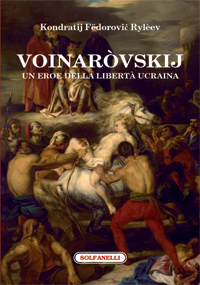 |
Kondratij Fëdorovič Ryleev
Voinaròvskij
a hero of Ukrainian freedom
(Solfanelli Editore- Chieti)
Italian version by
Alfredo Bertollo & Pier Luigi Coda |
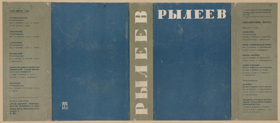
Ryleev; Works - Leningrad 1934
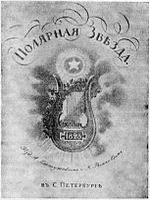
The Polar Star
|
“I'll be there in those fateful days?"
"If I fall in the battle for the law and the power, even if my contemporaries will not understand or will not evaluate me, you, my mother, you have to know the purity and sanctity of my intentions; perhaps posterity will justify me and the story will write my name with the name of the great men who died for humanity. For this, in history, Brutus looms over Caesar. "
With this certainty, in that misty day of July 13, 1826, Kondraty Ryleev (or Ryleyev) ascended the scaffold Tsarist really surrendering to the judgment of posterity and history. His revolution to overthrow the tyranny of power was miserably wrecked with the noose around his neck, but his example, his ideas and his poetry were flying, together with his soul, higher and higher in stormy skies of the nineteenth-century Russia .
|
He became the heroic symbol of revolutionary thought in the second half of the nineteenth century Russian: Gavrilovic Chernyshevsky in his book "What to do?" was inspired by Ryleev for his character Rakhmetov, as Sergey Nechayev in his "Catechism of a Revolutionary" to depict the emblematic ideal man of action. And women of action too, as Vera Ivanovna Zasulič. Year 1877. The notorious governor of Petersburg, General Trepov, had beaten till drop in blood and madness a poor political prisoner, Aleksej Bogoljubov, guilty of not taking off the hat before him. Vera organized a conspiracy and shot Trepovs mortally wounding him; in her "Memoirs" she wrote: "In some ways what I've done has been inspired by the poetry of Ryleev, Confession of Nalivaiko, that for me remains a holy relic ... I really know the fate of Ryleev. Wherever heroism, struggle and revolution are closely linked with pain and death. "
“One word: daring”
In "Pushkin and Baltic Countries" published by Solfanelli in 2011, Ninel' Ivanovna Podgornaja so presents Kondraty Ryleev: "He was the son of a small noble, petty and cruel man who beat his wife, he relegated her to the cellar and often beating even the son. After being freed from the influence of despotic father, the boy went over the Cadets Petersburg, studied with profit, he read a lot but it was the ringleader of all the pranks of his companions and always took the blame upon himself. If he happened to be punished by flogging, resumed immediately after insulting the officers. " |
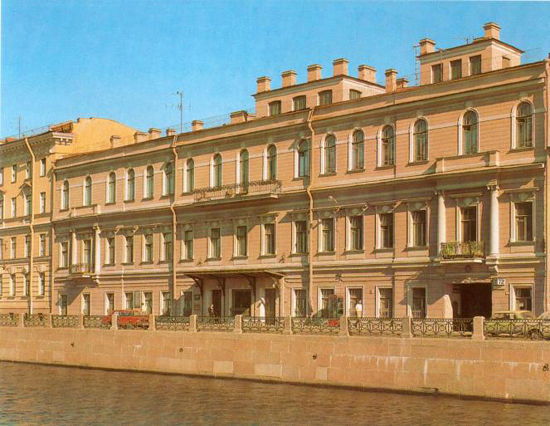
St. Petersburg; house where Rylèev lived on the river Moika |
BIOGRAPHICAL NOTES |
Ryleev was born September 18, 1795 in the village of Batovo, and studied at the Corps des Pages, the military academy of Imperial Russia who prepared the children of nobles and officers to military service. After graduation, he was drafted in the riding of the Artillery Brigade and participated in the Napoleonic campaigns from 1814 to 1815 in Poland, Germany and France.
At twenty-three he took leave from the army and was employed as a tutor at a small landowner whose daughter he married, Natalya Ivanova Teviasova, by whom he had two children.
From 1821 to 1824 he worked as a councilor in the Criminal Police of St. Petersburg and, in this position, he helped in many circumstances people of the people in trouble, as when he defended the peasants who revolted to Count Rasumovskij, despite the opposition of the popular judges favorable to the wealthy landowner.
In 1823, his friend Ivan Ivanovich Puščin convinced him to join the revolutionary Society of the North, formed mostly by veterans of the Napoleonic wars, the objectives of which were the abolition of serfdom and the replacement of the tsarist regime with a republican government or a constitutional monarchy.
Inside the Secret Society, Ryleev overlaid soon the prominent role of a true leader, and his conception of politics, which initially was inclined to a liberal democratic reform, it became more and more radical and, perhaps influenced by the thought of more extremist Pavel Pestel', he convinced that if the imperial family had refused exile, the only possible political solution would have been to the regicide: "A rebellion is crucial. The tactics of the revolution is enclosed in one word: daring. And if everything will be pain or failure will serve as an example for those who come after us.
|
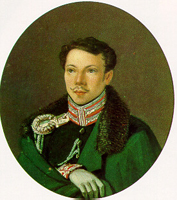
Aleksandr Aleksandrovič Bestùžev |
“Like a river of lava in full spate”
The Ryleev's house became a meeting place for members of the secret society. So the Polish poet Adam Mickiewicz recalls a meeting: "In the room we have been, more or less, a dozen people but, at first, I could not see anything because of the thick fog caused by the smoke of pipes and cigars. They were lying on the sofa or on the windowsill; the young Aleksandr Odoevskij and Aleksandr Bestùžev were sitting cross-legged in Turkish fashion on a Persian rug ... a pale young man, with a prominent forehead, looking like Shelly, raised his glass: "Death to the Tsar." The toast was received with excitement. The eyes of blacks Ryleev brightened as crossed by an inner flame. Everyone drank except myself a Pole and a guest. Toasting the death of Tsar ... ".
|
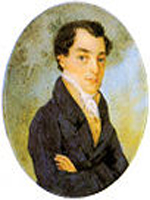
Kondratij Fëdorovič Rylèev |
And, in the midst of the congregation, Nikolaj Bestùžev, the brother of Alexander, so recalls Ryleev: "The physical appearance was not attractive and the manner of its expression was simple, but when he faced his favorite theme - the love for his country - his face lit up, his bright eyes sparkled with an unearthly light blacks and his words overflowed like a river of lava in full spate. "
“You brought the people to ruin ...”
With the temper that he had, it is no wonder if Ryleev not look at anybody. And so it was also against the odious, despotic and cruel confidant of Tsar Alexander I, Alexei Arakcheev, to whom the poet, with a courage truly unheard, turned his satire To the favorite: "Arrogant dolphin and perfidious and treacherous / The crafty flatterer of the monarch and ungrateful friend / Tyrant violent of your native country / Your actions reveal who you are / The people know that you have suppressed freedom / And that you brought to ruin by the oppression of taxes / E deprived the villages of their primitive beauty ... ".
This satire, written in 1820, aroused wide resonance and Ryleev earned him the attention of literary circles. The same Ryleev was surprised that he had passed the censorship and, in a letter to his friend Bedraga, wrote: "My satire was published in the tenth issue of the Spectator of the Neva. Many wonder how he could overcome censorship ... "
A year later he enrolled at the Free Society of Lovers of Russian literature and, from 1823 to 1825, along with Aleksandr Bestùžev they issued the periodical annual Polar Star, one of the most progressive literary magazines of the time with the contributions of important poets and writers including: Pushkin, Zhukovsky, Baratýnskij, Vyazemsky.
From that period are his poetic most significant writings : Civic Courage, The Citizen, The confession of Nalivaiko, Voinaròskij; inspired by the Polish poet Niemcewicz also wrote a volume of Meditations historical and patriotic. But, in the background, always shines, loud and rebellious, the George Byron's song which, in the early nineteenth century, was flying across the borders of all Europe.
“I'm not a poet but a Citizen”
To his friend Aleksandr Bestùžev to whom Ryleev dedicates his poem Voinaròskij writes: "Accept the fruits of my work / Fruits of my free time and carefree; / I know, my dear, you welcome them you / With all the affection of a friend. / you, as a discerning son of Apollo, / there you'll find not art / but vivid feelings; / I am not a poet but a Citizen. "
To describe the mission of the poet, Ryleev uses the word "citizen", "a term that acquires new puissance in its use." Ryleev, quoting himself, calls himself "Citizen" and urges the literary friends, including Pushkin, to be "citizens". What actually meant Ryleev with the word "citizen" explains the writer Vasily Grigoryevich Bazanov "The Citizen, in the sense decemberist is, above all, an eloquent speaker, a public officer who, with conviction demonstrates the appeal of freedom and the intolerable nature of slavery. "
|
“Alas! My country is suffering ...”
In Ryleev literary and political engagement go hand in hand. It is impossible to separate the two aspects without affecting the substance of the man and the poet. Rightly Patrick O'Meara in his biography of Ryleev notes: "His poetry is inextricably linked with his revolutionary activities and, to quote a colourfl phrase of a Soviet commentator, he rises, as a fighter, the flag of a conscious battle against serfdom and tsarism ".
Alexander Herzen wrote: "I remember that his verse rang like a bell that called to battle and death as called to a banquet."
But it is the same Ryleev to explain what it is for him to write in verse: "In my mind there is no place for love / Alas! My country suffers / My soul is shaken by heavy thoughts / Now it's just thirsty for freedom. "
Right.Portrait of K.F. Ryleev by O-A- Kiprenskij
|
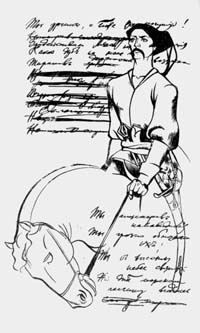
|
And again: "Should I kill my young years in sleep of idleness? / Should I stop to raise the banner of freedom? / No! I Have Not! I will never let this happen to me / "
"Ah, I feel sick / of the Fatherland too, / I don't want anything / it is expected really / A heavy destiny for centuries. / For a long time the Russian people / Will be junk of lords / For a long time they'll traffic with people / As with animals. "
His verses were sung by soldiers and peasants of all Russia that, for a moment, dreamed freedom not being able to have it. |
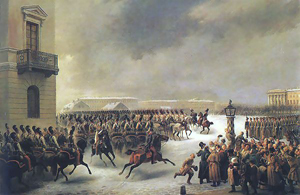
Vasily Timm; The decemberist revolt
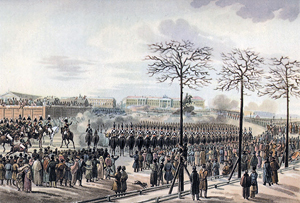
Karl Kolman; Decemberists on place
|
“Through every kind of hellish ordeal”
There is a wonderful song by Luigi Tenco which says: "And looking around the eyes / that future which they dreamed / but dreams are still dreams / and the future is almost past."
Here, the dreams of freedom of Ryleev and of the decemberist revolution foundered miserably on the morning of December 14, 1825, when, in the Senate Square in St. Petersburg, the Tsarist forces stifled the attempts of insurrection shouting "Constitution". The night before, as recalled by the friend Decembrist Gavriil Baten'kov, Ryleev had prefigured: "Most likely we will die, but if we continue to sleep, we will never be free."
Andrei Rozen, one of his closest friends, said that "he was ready to cross all kinds of hellish ordeal just to make himself useful to his native country."
December 15 Ryleev was arrested on charges of treason and regicide, and for his role as a leader, he was sentenced to be quartered. The sentence was commuted in the hanging. During the many interrogations that followed his arrest, Ryleev tried desperately to accept all the consequences of the uprising exonerating mates and pleaded with the Investigative Committee to condemn the execution just him: "If it is necessary an execution for the good of Russia, only I deserve. I have long prayed that this only concerns me and that all others are returned, by the grace of God, their families, their homeland and their noble tsar ".
|
Useless, as recalled Ninel 'Podgornaja: "In the misty morning of July 13, 1826, in the citadel of the Peter and Paul fortress, loomed dimly five forks. Pavel 'Ivanovic Pestel', Kondraty Ryleyev, Pyotr Kakhovsky, Sergei Ivanovich, Murav'ëv-Apostol and Michajl Pavlovich Bestùžev proceeded under escort barely dragging their legs under the weight of the chains. They lifted them on stage, put them under the forks, they covered their faces with the bearskin hats canvas rough and marched from under the docks. Under the weight of the chains snapped the ropes of three convicts, including Ryleev, and the bodies broke through the boards of the stage and fell into the pit. Carried them mangled blood. Murav'ëv-Apostol shouted: "In Russia do not even know how to hang well." The five forks appeared still in draft and Pushkin in his verses: "As others like them if they are not anymore."
All planned and calculated . In Confession of Nalivaiko Ryleev had written: "I know that the ruin waits / The one who first rebels / oppressor of the people. / Fate has already condemned me. / But tell me, where ever you conquer freedom / Without sacrifice ? / I will die for my land / I can feel it, I know / And happy, Holy Father / I bless my fate. "
|
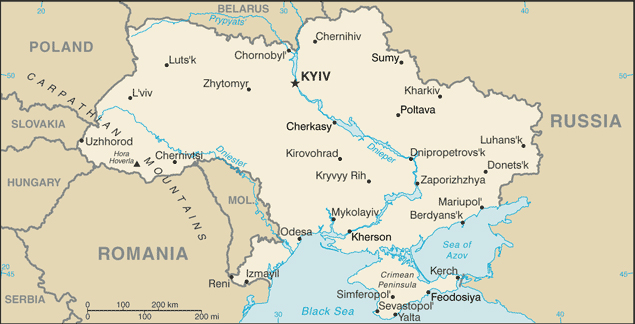
Ukraine to the present day
|
| VOINARÒVSKIJ - a hero of Ukrainian freedom |
The breath of time and life
Today the historical / literary critical substantially agrees to assess more political thought that the poetic work of Ryleev. Dmitry Mirsky in his History of Russian Literature published in Italy by Garzanti, dismisses it in a few lines: "With few exceptions, his poems are bombastic and conventional ... The best things are those suggested by his revolutionary ardor: the narrative fragment The Confession of Nalivàjko especially the Citizen. The latter is one of the most beautiful songs of revolutionary eloquence in the Russian language."About Voinaròvskij" adds, "Although not a perfect work of art, and there is something monotonous in his rhythmic cadence, it is nevertheless a noble and manly poem, genuinely inspired love of freedom."
Nothing ... yet ...
Yet in 1823 the fame of Ryleev poet began to grow, and when at a public poetic meeting in the house of Gavriil Derzhavin read some passages of his Voinaròskij, on the pages of the Archive of the North appeared the following comment: "If the whole poem is written with the same feeling and the same power locked up in passages read, then the name of Ryleev will be counted among the best Russian writers ... must honestly acknowledge that the talent of Mr. Ryleev is growing and promising the country a poet whose reputation will last far greater than some critics suppose now ... ".
And Aleksandr Ivanovich Turgenev, in the same year, wrote a letter to Vyazemsky saying: "Ryleev is writing a beautiful poem."
The fact is that in Voinaròvskij frees the breath of time and life. In the silence of the snowy siberian wilderness, are welded accounts remained outstanding with its existence. Then the line is soul, takes effect and becomes poetry; cold and harsh, anguished and defeat, but true poetry.
Voinaròskij known to have fought for the freedom of his people and knows how to die for the freedom of his people, but he also knows that his life has never really belonged to himbecause Uncle Mazeppa has always ruled the fate and choices. Now, in the last moments, discover the greatness of freedom and action but, at the same time, tremble pitifully in front of himself, his memories, the lighting of youth. He would like to re-appropriate of the days of his past, live again in the splendor of the luxurious European courts. Among his hands still waving the flag of freedom, but from his fingers escapes the entire song of life and tragically haul down the flag of illusions.
Aleksandr Pushkin who knew what poetry is, maybe all this had understood and, not surprisingly, in his work Poltava imitated several steps; in a letter to Aleksandr Bestužev writes ironically to "be sorry not to have killed in duel Ryleev" because he considered his most serious rival in Olympus Russian literary.
|
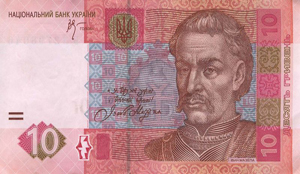
Ivan Mazepa portrait on Ukraine Hryvnia
|
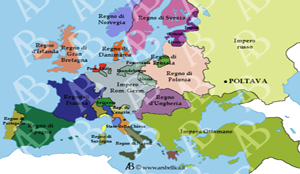
Ukraine at the time of the war of Poltava
|

Poltava: Museum of Culture and History: The Battle of Poltava
|
“It's time to be men, not only husbands”
The Rilèev Voinaròvskij's is actually a kind of Chinese box. Inside you will discover ideals, paths and crossroads of life, people and peoples, oppressed and oppressors. Voinaròvskij drags his pitiful Shakespearean odyssey during his exile in Siberia, a desert of geography and of souls, where he meets the German scientist Miller with whom he confides.
The result is a fresco of feelings and emotions: the overwhelming nostalgia for the homeland Ukraine oppressed by Tsarist Russia; the tragic and powerful portrait of Uncle Mazeppa, hetman of Ukraine, trying to shake his people from the yoke of Peter the Great; the sweet family memories as painted interior scenes; especially the deep breath of freedom and of any sacrifice to conquer.
However it is not surprising that a Russian to the roots of his hair as Ryleev was has taken as a symbol of his libertarian vision and policy precisely the Ukrainian people and two Ukrainian leaders as Mazeppa and Voinaròvskij. Explains the same Ryleev in a letter written in December 1825 to Mykola Markevych, descendant of a prominent family Cossack and future historic of Ukraine: "I am Russian, - writes Ryleev, - but I spent three years in Ukraine: no too long, but for me enough to fall in love with this land and its friendly inhabitants. Ukraine also gave me an uncommon, incomparable wife. My good Ukrainian lady made me happy for six years and for that my attachment was completed with the gratitude of my soul."
And Ihor Siundiukov adds: " Ryleev considered Ukraine as the most shining example of a country and a people ready to sacrifice their lives for an ideal of freedom. Like when the author of the poem Nalivaiko let to pronounce to his hero these beautiful words: "The time has come, my friends, to be men and not only husbands". And these words are deeply felt. "
The history rewrites itself
On "La Stampa" of Turin of 17 August 2014, Enzo Bettiza writes: "The history of Ukraine was in fact the story of a nation uncertain on which impend Russia from East, from North Scandinavian States and Poland from West. Hitler and Stalin did in fact disappear it from the map. After the Second World War re-emerged as a weak state, crushed by Moscow and nibbled from Warsaw. Its autonomy and its specificity continued to breed with increasing weakness. "
Over the centuries the region of Ukraine has been a greedy bite for a colorful array of peoples: the Scandinavian Rus', Byzantines, Mongols, Lithuanians, Poles, Austro-Hungarians, Russians and Cossacks. In a succession of states and small states that passed from one flag to another; in the second half of the seventeenth century Bohdan Khmelnytsky was proclaimed hetman of the Cossacks and he led the revolt against Poland, which ended with the establishment of an autonomous state Cossack, originally a vassal of the Poles. A few years later, in 1667, the state Cossack found itself divided over the course of the Dnepr: the western half was a vassal of the Poles, the east of the Russians.
And here we come to the time of Mazeppa and his nephew Voinaròvskij.
In 1708 the Ukrainian hetman Ivan Mazepa rebelled against the Russians with the support of Charles XII of Sweden who had invaded the Ukraine, during the Great Northern War. The revolt was, however, fiercely repressed by Peter the Great who, in 1709, with the decisive battle of Poltava defeated the troops of Mazeppa and Swedes thus breaking every yearning for freedom.
In 1764 Catherine II of Russia annexed the state Cossack to Russian territory.
Now, in this strange summer of 2014, the weapons between Ukraine and Russia have started to thunder rumbles with claims of massacres, destruction and arrogant protervie. The history rewrites itself in the blackest pages of his journey
With a note of despair, Ihor Siundiukov notes: "The history of cultural relations between Ukraine and Russia is full of dramatic, contradictory and sometimes occasional tragic pages. It is not easy to read; you have to analyze and reconsider many things of the past of our people and, more often than not, reject the simplistic conception of the world as "black or white. In the past this has it all: a cynical imperial impulse and a blatant arrogance from the great state, when the highest authorities of St. Petersburg and Moscow openly refuse to admit the existence of the Ukrainian language and culture rather than the mutual enrichment of the spiritual worlds of these two Slavic peoples with a fruitful and creative competition. "
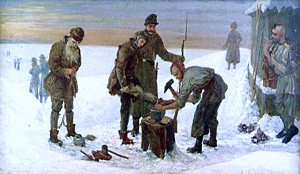 Prisoners in Siberia
Prisoners in Siberia
(Aleksander-Sochaczewski) Painting out of text |
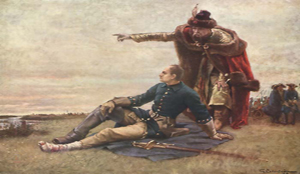 Carlo XII and Mazepaon the river Dneper
Carlo XII and Mazepaon the river Dneper
(Gustaf Cederström) Painting out of text |
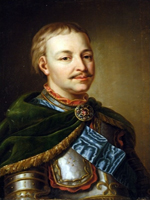 Mazeppa
Mazeppa
(Author unknown)
|
“I would be the first to hit him if he became an enemy of freedom”
The controversial and mysterious character of Mazeppa inspired the art of poets, writers, musicians and painters. Too intriguing his life, too Shakespearean to escape the artistic mythology of the "Great historical figures": pride, ambition, cunning, rebellion, love, political and military strategy, luck and misfortune are the facets that still imprison, in bold, the usual puzzling question: but, ultimately, was a hero or a sinister traitor? A courageous leader who fought for the freedom of the Ukrainian people, as it interprets Ryleev, or a measly unrealistic opportunist swollen with hatred and revenge staff towards Russia and Peter the Great, as would tend Pushkin?
|
Points of view, as well summarizes Ihor Siundiukov: "The Mazeppa by Pushkin, as outlined with notable intelligence, is brutal, cruel and selfish. Ukraine is his last thought, the hetman aims at his only interest. Instead of the Mazeppa by Ryleev moved largely by a patriotic spirit and not from mercenary motives and really fights for freedom. "
Sure, the Mazeppa by Ryleev is seen through the eyes and the memory of his nephew Voinaròvskij that exiled in the eternal snows of Siberia, tells his tragic story to the German scientist Miller, who accidentally meets in Yakutsk.
Yet also in Voinaròvskij remains doubts about his uncle: "I do not know if he wanted / Save the Ukrainian people from the torments / O erected a throne for himself. / The hetman I have never revealed this secret ... / But I know that, forgetting / Love, affection and the voice of nature / I would have been the first to hit him / Had it become the enemy of liberty. "
The reader may judge following the tragic song of Voinaròvskij of Ryleev in the beautiful translation of Alfredo Bertollo; translation passionate and dense, while modernizing the nineteenth-century language and giving up the rhythmic ABAB, protecting the beauty of expression as well as the powerful, often painful, poetic text watermark.
Pier Luigi Coda
|
|
|

